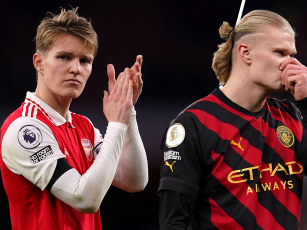The current Bundesliga summit doesn’t make pretty reading for neutrals. The inevitable Bayern Munich lead the way, of course, but the top three is completed by an unusual pair - the only other two unbeaten sides in the division.
Hoffenheim’s Sunday win over Hertha Berlin took them onto the podium, but if the former village team propelled upwards by software magnate Dietmar Hopp’s money have never met with popular acceptance, it’s nothing compared to the hostility fostered by the team currently in second spot.
The prefix of RB Leipzig isn’t an acronym of owners Red Bull – Germany’s football statutes forbid the changing of names to include advertising by sponsors, so it stands for ‘RasenBallsport’ – but the shadow of the energy drink manufacturer looms long over the club’s persona.
It was only founded in its current form in 2009, with Red Bull buying the playing license of fifth-tier club Markranstädt, and naming them in its own image, with the expressed aim of reaching the Bundesliga within eight years. They did it with 12 months to spare.
In a country where fan culture is still powerful, the notion of authenticity matters. Clubs that are exempt from the 50+1 rule of member fans carrying a majority stake, like the original factory teams of Bayer Leverkusen and Wolfsburg, are mocked. The meeting between the pair is often referred to as ‘El Plastico’.
Leipzig, however, are seen as having taken a big step further than simply plentiful corporate backing. This is corporate rebranding, flying in the face of what many German football fans believe represents the tradition and soul of the national game.

Image: RB Leipzig celebrate with coach Ralph Hasenhuettl (second left) after scoring a goal during the German first division Bundesliga against SV Werder Bremen (AP Photo/Jens Meyer)
There have been protests, from back in August when fans of near-neighbours Dynamo Dresden threw a severed bull’s head onto the pitch during a DfB Pokal match, to the September visit of Borussia Dortmund to the Red Bull Arena, which was snubbed by BVB’s largest fan group Südtribüne Dortmund, who rejected their allocation of tickets.
The awkward truth, however, is that Leipzig aren’t going anywhere. The newly-promoted side have gone from strength to strength since dramatically beating Thomas Tuchel’s team in that game, and their win at Darmstadt on Saturday was their fourth in a row in the Bundesliga.
A Europa League spot might have been a legitimate target at the start of the season, but with Leverkusen, Borussia Mönchengladbach and new-look Dortmund all stuttering, this most ambitious of clubs might soon be able to start aiming even higher. They are currently just two points behind Carlo Anceoltti's Bayern.
There is certainly a feeling that their success is sustainable. Having money is one thing, but having the brains to use it well is something else. Even if they’re not directly comparable, they have plenty in common with Hoffenheim in terms of team-building. Leipzig’s current success is the result of smart planning, as well as bucketloads of cash.
Just as Hoffenheim spent big on budding young talent like Luiz Gustavo and Carlos Eduardo, Leipzig have done a similar thing in getting the likes of Sweden’s Emil Forsberg and young Scot Oliver Burke - signed from Nottingham Forest - on board.

Image: Leipzig teammates celebrate after the Bundesliga match against Borussia Dortmund in Leipzig (AP Photo/Jens Meyer)
Saturday’s win also underlined the real depth at coach Ralph Hassenhüttl’s disposal. Second-half substitute Marcel Sabitzer scored both the goals in the 2-0 victory, with the second set up by a delicious piece of wing play by his fellow sub, the aforementioned Burke, who signed for €15 million. Previous club record signing Davie Selke, who dropped a division to join from Werder Bremen in summer 2015, and Kyriagos Papadopoulos (on loan from Leverkusen) were also on the bench. RB have plenty in reserve.
With sporting director Ralf Rangnick – who coached the team before Hassenhüttl’s arrival and has been linked to the England job – pulling the strings, there’s the strategy to go with the club’s excellent facilities. Local support is good, and even if many fans find Leipzig’s model hard to stomach, others are already getting over it. That 4,000+ allocation of tickets declined by the Südtribüne and friends was sold out to other Dortmund fans inside 23 minutes.
Whether Leipzig’s success opens the door to a more corporate future for German football remains to be seen, but the signs are that their continued presence will keep the discussion going for a while yet.
Download the brand new OffTheBall App in the Play Store & App Store right now! We've got you covered!
Subscribe to OffTheBall's YouTube channel for more videos, like us on Facebook or follow us on Twitter for the latest sporting news and content.








